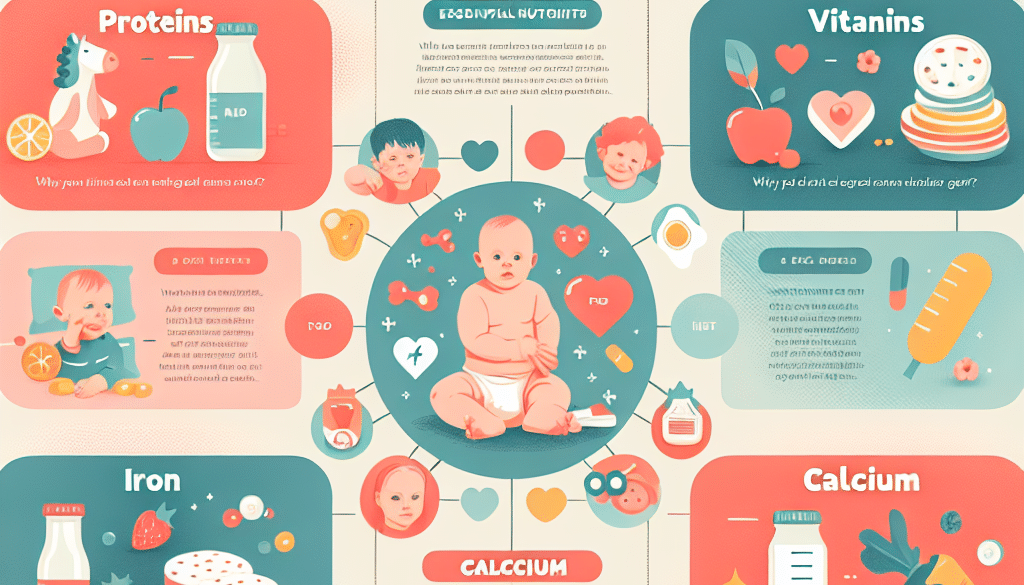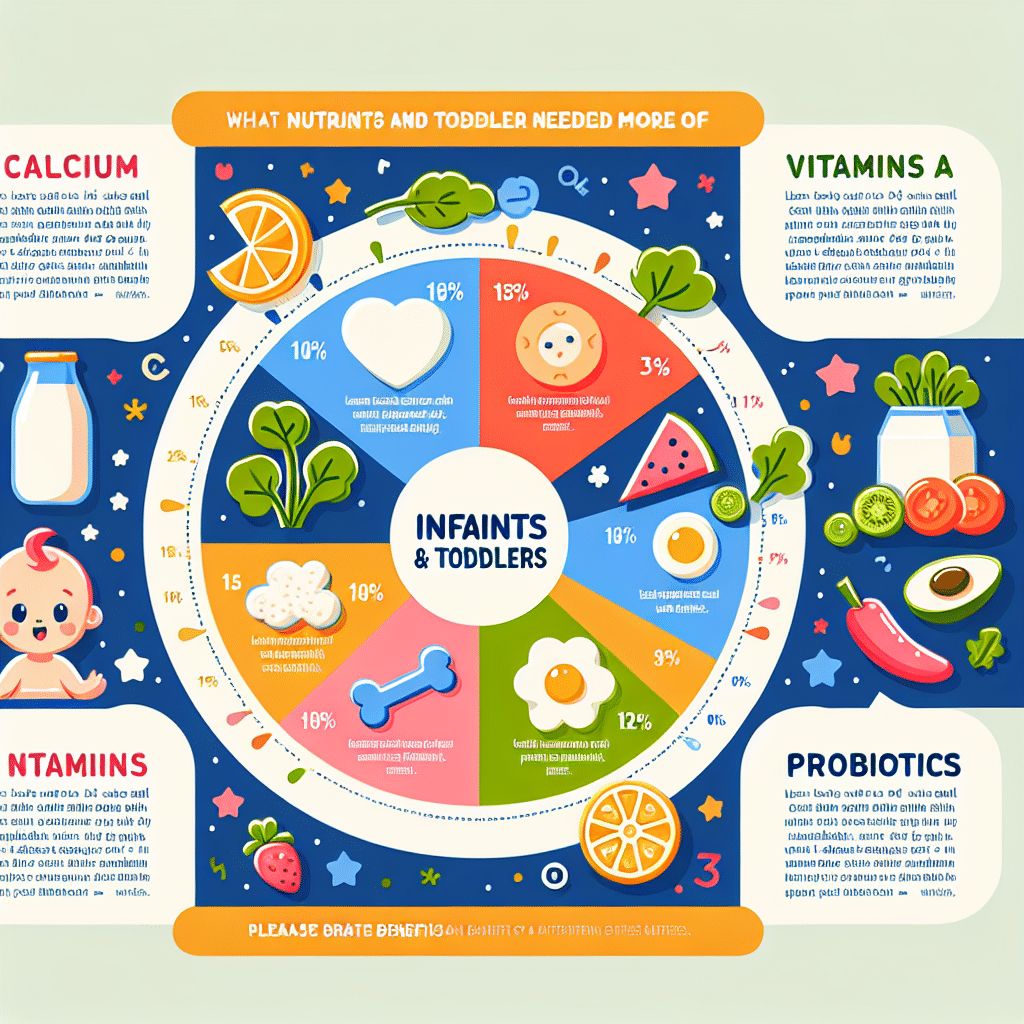What Nutrients Should Infants and Toddlers Get More Of?
-
Table of Contents
- Essential Nutrients for Infants and Toddlers: A Comprehensive Guide
- Importance of Balanced Nutrition in Early Childhood
- Key Nutrients for Infants and Toddlers
- Iron: A Critical Component for Developing Brains
- Case Study: The Impact of Iron Supplementation
- Calcium and Vitamin D: Building Blocks for Strong Bones
- Statistics on Vitamin D Deficiency
- Omega-3 Fatty Acids: Essential for Brain and Eye Development
- Protein: The Building Block of Growth
- Fiber: Promoting Healthy Digestion
- Zinc: Supporting Immune Function and Cell Growth
- Vitamins A, C, and E: Antioxidants for Overall Health
- Conclusion: A Balanced Approach to Infant and Toddler Nutrition
- ETChem’s Protein Products for Nutritional Support
Essential Nutrients for Infants and Toddlers: A Comprehensive Guide
The early years of a child’s life are critical for establishing a foundation for lifelong nutrition and health. Infants and toddlers have unique nutritional needs to support their rapid growth and development. Ensuring that they receive the right balance of nutrients is essential for their physical and cognitive development. This article will delve into the key nutrients that are particularly important for infants and toddlers and discuss how to incorporate them into a young child’s diet.
Importance of Balanced Nutrition in Early Childhood
During the first few years of life, children experience rapid growth and development that requires a balanced intake of essential nutrients. These nutrients play a vital role in forming strong bones, developing a robust immune system, and supporting brain development. A deficiency in any of these nutrients during this critical period can have long-term effects on a child’s health and development.
Key Nutrients for Infants and Toddlers
While a balanced diet is important at any age, there are certain nutrients that are particularly crucial during infancy and toddlerhood. Here are some of the key nutrients that should be emphasized in the diets of young children:
- Iron: Essential for cognitive development and preventing anemia.
- Calcium: Crucial for building strong bones and teeth.
- Vitamin D: Works with calcium to support bone health and immune function.
- Omega-3 Fatty Acids: Important for brain and eye development.
- Protein: Necessary for growth, development, and immune function.
- Fiber: Promotes healthy digestion and prevents constipation.
- Zinc: Supports the immune system and aids in cell growth and repair.
- Vitamins A, C, and E: Vital for vision, skin health, and protecting the body from free radicals.
Iron: A Critical Component for Developing Brains
Iron is a vital nutrient for infants and toddlers, particularly for cognitive development and the prevention of iron-deficiency anemia. Breast milk or iron-fortified infant formula provides adequate iron for the first 4-6 months. After this period, iron-rich foods such as pureed meats, fortified cereals, and legumes should be introduced.
Case Study: The Impact of Iron Supplementation
A study published in the Journal of Nutrition demonstrated that iron supplementation in iron-deficient infants could improve cognitive and motor development. This highlights the importance of monitoring iron levels and ensuring adequate intake during infancy.
Calcium and Vitamin D: Building Blocks for Strong Bones
Calcium and vitamin D are partners in building strong bones and teeth. While breast milk and formula provide some calcium, additional sources like dairy products, leafy greens, and calcium-fortified foods are beneficial as children grow. Vitamin D, which can be synthesized from sunlight exposure and obtained from fortified foods or supplements, is essential for calcium absorption.
Statistics on Vitamin D Deficiency
According to the American Academy of Pediatrics, many children do not receive enough vitamin D, with a reported deficiency rate of up to 25% in the United States. This underscores the need for attention to vitamin D intake.
Omega-3 Fatty Acids: Essential for Brain and Eye Development
Omega-3 fatty acids, particularly DHA, are crucial for brain and eye development. Sources of omega-3s include breast milk, formula fortified with DHA, and foods such as fish, flaxseeds, and walnuts. Introducing fish into a toddler’s diet can help ensure adequate omega-3 intake.
Protein: The Building Block of Growth
Protein is essential for the growth and repair of tissues. Infants and toddlers need protein to support their rapid development. Good sources of protein include breast milk, formula, meats, dairy products, eggs, and legumes.
Fiber: Promoting Healthy Digestion
Fiber is important for maintaining a healthy digestive system and preventing constipation, a common issue in toddlers. Fruits, vegetables, whole grains, and legumes are excellent sources of fiber that can be incorporated into a child’s diet.
Zinc: Supporting Immune Function and Cell Growth
Zinc plays a role in immune function, cell growth, and repair. It can be found in a variety of foods, including meat, dairy, whole grains, and fortified cereals.
Vitamins A, C, and E: Antioxidants for Overall Health
Vitamins A, C, and E are antioxidants that help protect the body from damage caused by free radicals. They also support vision, skin health, and the immune system. Colorful fruits and vegetables are rich in these vitamins.
Conclusion: A Balanced Approach to Infant and Toddler Nutrition
Ensuring that infants and toddlers receive a balanced diet rich in the nutrients discussed is crucial for their growth and development. Parents and caregivers should focus on providing a variety of nutrient-dense foods to meet the needs of their growing children. Consulting with a pediatrician or a registered dietitian can help tailor a nutritional plan that supports a child’s individual needs.
ETChem’s Protein Products for Nutritional Support
For those looking to supplement their child’s diet with additional protein, ETChem’s protein products can be a valuable addition. Their high-quality collagen products are designed to support the nutritional needs of individuals at every stage of life, including infants and toddlers.
About ETChem:
ETChem, a reputable Chinese Collagen factory manufacturer and supplier, is renowned for producing, stocking, exporting, and delivering the highest quality collagens. They include marine collagen, fish collagen, bovine collagen, chicken collagen, type I collagen, type II collagen and type III collagen etc. Their offerings, characterized by a neutral taste, instant solubility attributes, cater to a diverse range of industries. They serve nutraceutical, pharmaceutical, cosmeceutical, veterinary, as well as food and beverage finished product distributors, traders, and manufacturers across Europe, USA, Canada, Australia, Thailand, Japan, Korea, Brazil, and Chile, among others.
ETChem specialization includes exporting and delivering tailor-made collagen powder and finished collagen nutritional supplements. Their extensive product range covers sectors like Food and Beverage, Sports Nutrition, Weight Management, Dietary Supplements, Health and Wellness Products, ensuring comprehensive solutions to meet all your protein needs.
As a trusted company by leading global food and beverage brands and Fortune 500 companies, ETChem reinforces China’s reputation in the global arena. For more information or to sample their products, please contact them and email karen(at)et-chem.com today.





